May 31, 2025 | 14:54 GMT +7
May 31, 2025 | 14:54 GMT +7
Hotline: 0913.378.918
May 31, 2025 | 14:54 GMT +7
Hotline: 0913.378.918
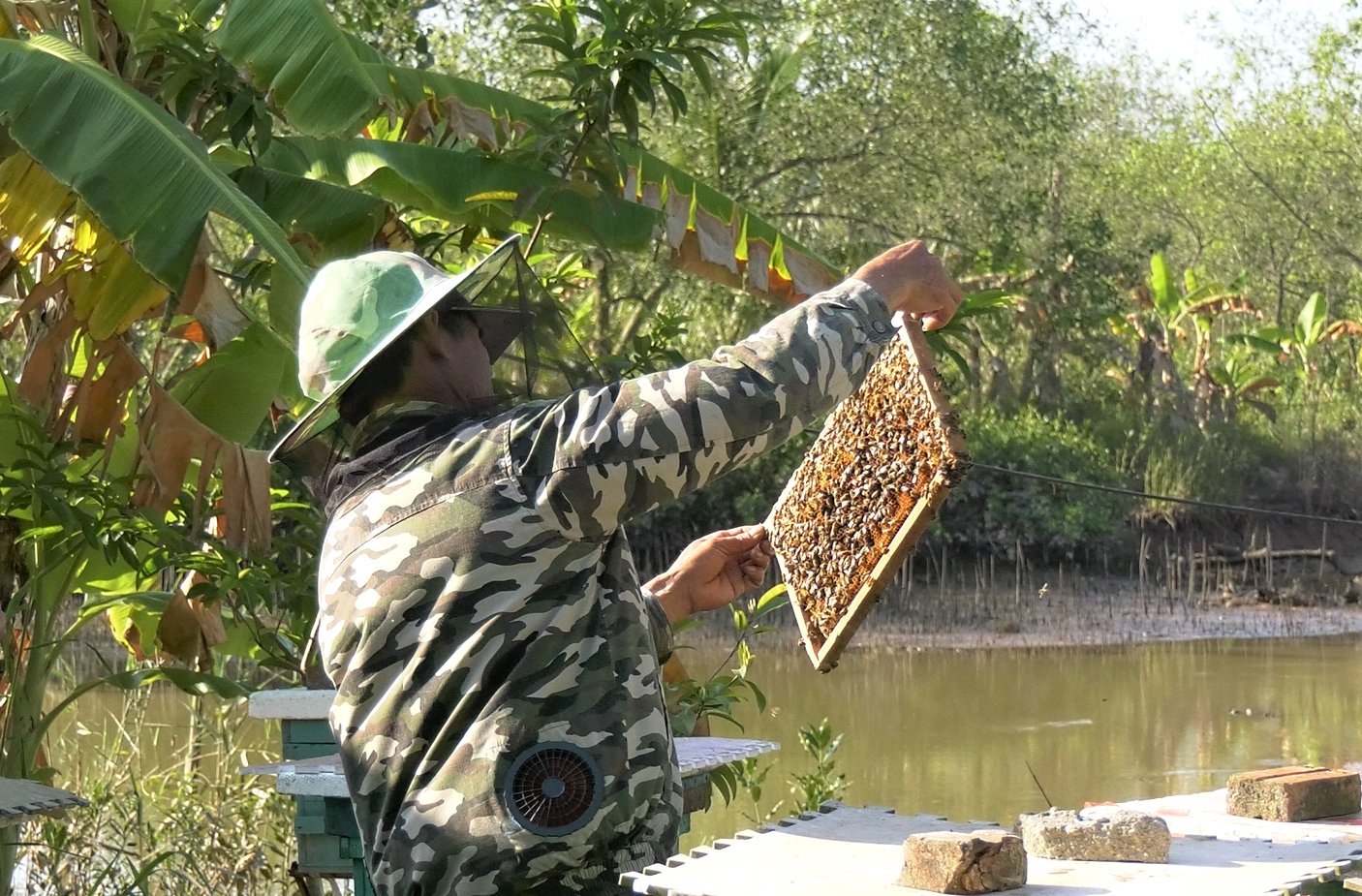
Many households in Dai Hop commune, Kien Thuy district have switched from aquaculture to beekeeping. Photo: Dinh Muoi.
Derived from the fact that there is a relatively large area of mangrove forest, with a variety of tiger, cork, parrot... favourable conditions, suitable for bee colonies to grow and develop, some households in Dai Hop commune, Kien Thuy district, Hai Phong city has transformed the economy from small coastal fishing to beekeeping for honey.
The bee breeds selected by households are mainly domestic bees, small in size, stable flower areas, and have few diseases. From the initial efficiency, to expand the production scale, the local people's beekeeping cooperative was established in 2010. It gathers people who share the same needs and goals of economic development from this profession.
Typically, at Tung Hang Honey Cooperative, the cooperative's pure mangrove flower honey product is OCOP certified with 3 stars and is making steady and sustainable development steps.
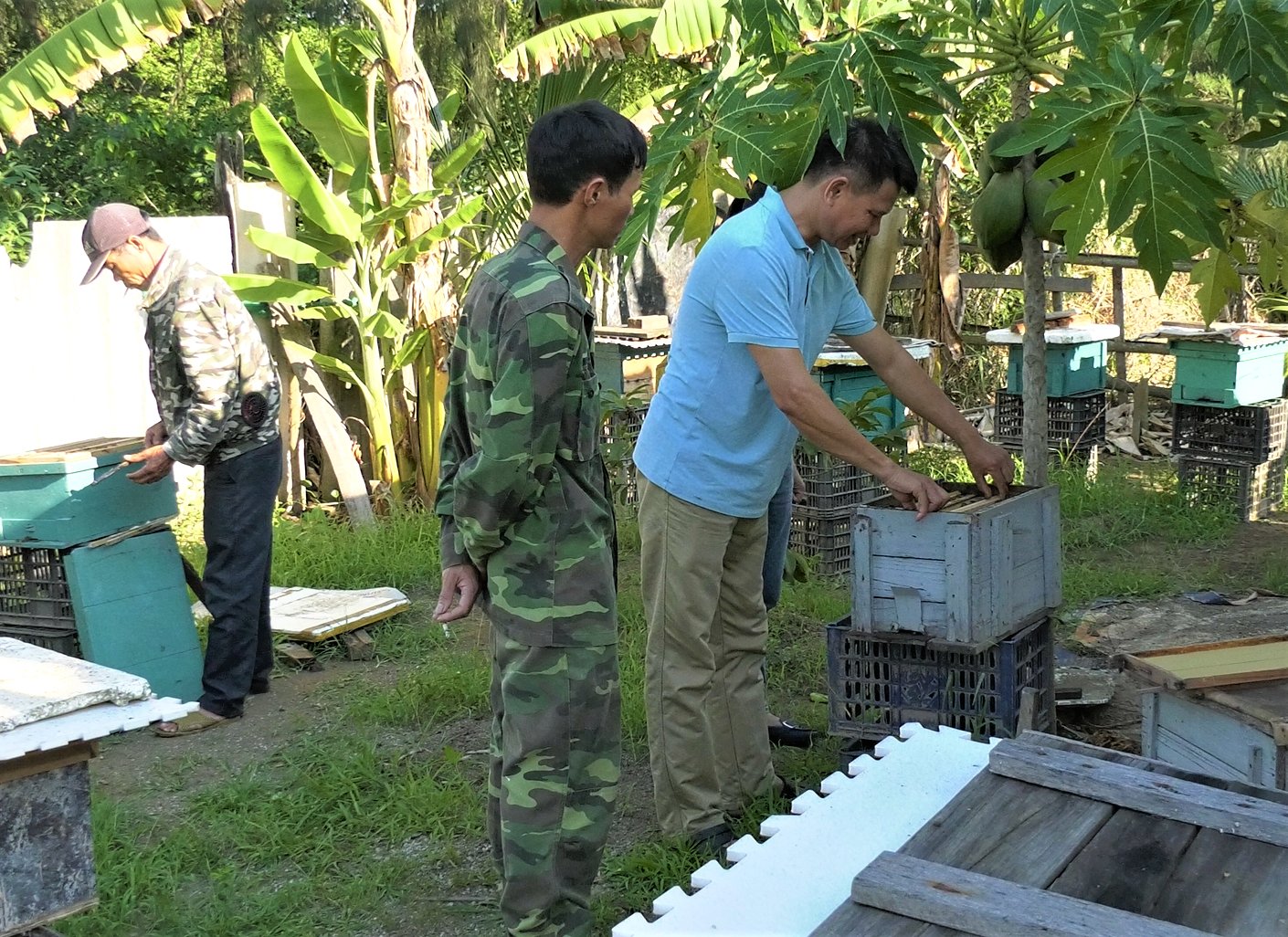
Mr. Dang Thanh Tung, Director of Tung Hang Honey Cooperative shared his experience of beekeeping with people. Photo: Dinh Muoi.
In May 2020, Tung Hang Honey Cooperative was officially established under the Law on Cooperatives 2012, which opened a new direction for beekeeping here. With outstanding quality thanks to natural mangrove flowers, also in 2020, the cooperative's honey products are certified with 3-star OCOP.
Thanks to the full stamp, origin, food hygiene and safety certification, honey products of the cooperative have increasingly improved their competitiveness in the market compared to the past.
Dang Thanh Tung, Director of Tung Hang Honey Cooperative shared that the cooperative was established based on a beekeeping cooperative group with 12 members, at that time there were only more than 800 colonies. Up to now, the cooperative has about 1,000 bee colonies. On average, each bee colony harvests about 12 litres of honey each year. The total volume of honey reaches more than 10,000 litres/year, supplying to many markets such as the northern and central provinces, gradually asserting its position in the market thanks to product quality.
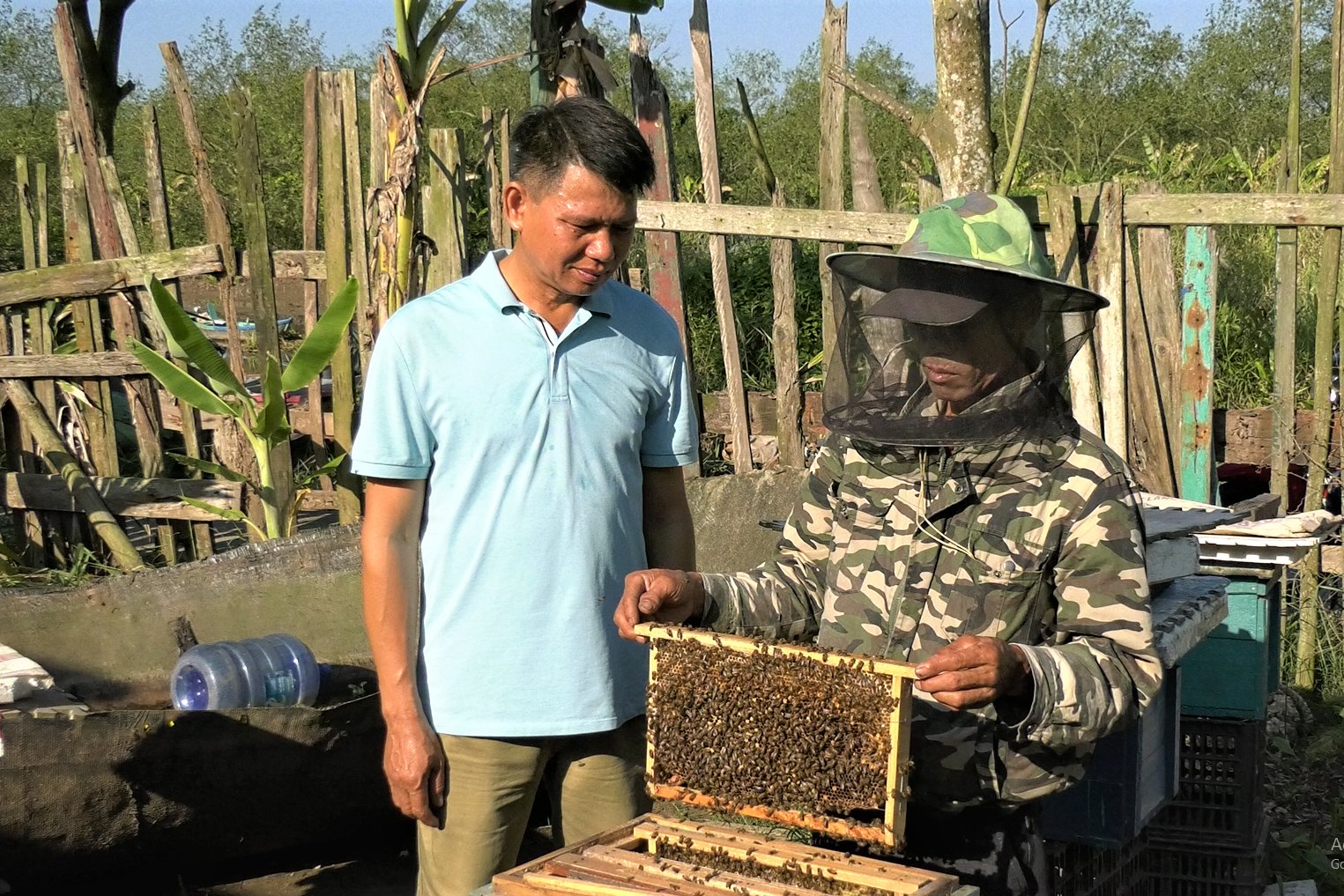
The bee breeds selected by households are mainly domestic bees, small in size, stable flower areas, and have few diseases. Photo: Dinh Muoi.
About the fate of beekeeping, Mr Tung recalled, in 1997, Dai Hop commune was one of the localities implementing the project "Mangrove Planting - Disaster Risk Reduction" funded by Japan with a total area of more than 650 ha.
In 2000, mangrove trees (mainly species such as parrots, tigers, mangroves, cork, and vines...) started to flower. Since then, beekeepers in other provinces and cities began to move the bees together to the mangrove area of Dai Hop for the bees to suck nectar from the flowers.
At this time, many households in Dai Hop commune mainly followed the riverine fishing profession and immediately learned the profession from beekeepers. They gradually realised that beekeeping brings high economic efficiency and is friendly to the environment, so some households have shifted their economic development to beekeeping.
Unlike bees raised in other places, when bees suck nectar from lychee flowers or coffee flowers, there is only enough food for bees for about 1-2 months. At the end of the flower season, beekeepers have to move the colony. While the 650 ha mangrove forest of Dai Hop commune produces flowers almost all year round (from 10 to 12 months), which is an abundant source of food for the bees.
In the time of August - September, the yield of mangrove flowers is less, and the members of the cooperative move the bees to the neighbouring locality, which is Bang La ward (Do Son district), where hundreds of ha of Bang La apples bloom for honey bees.
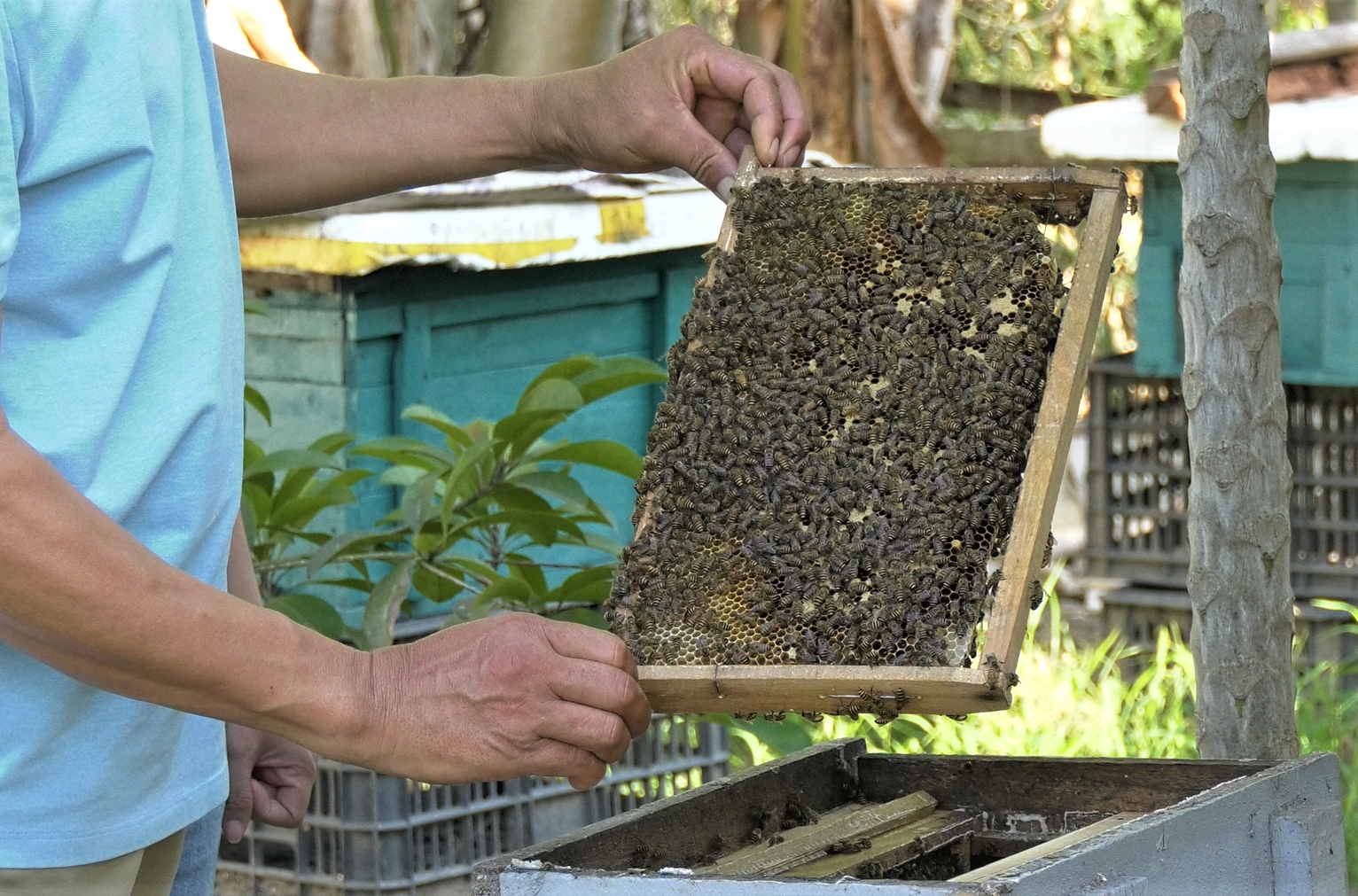
Mangrove beekeeping has high economic value. Photo: Dinh Muoi.
“After being certified for OCOP products, having labels, origins, certificates of food hygiene and safety, containers,... the value of the product has increased and is known by many people. Currently, we are selling to the market for VND 300,000/litre, this price is not low, but the cooperative's honey sell immediately after harvest. The consumption market is not only in Hai Phong but also spread to Quang Ninh, Hanoi, Thanh Hoa, Nghe An,... ", Mr. Tung said.
According to Hai Phong Agricultural Extension Center, Tung Hang Honey Cooperative is interested in investing in the Hai Phong City People's Committee and the Department of MARD for a system of water separators to hydrolyze honey. Thanks to this modern machinery system, the honey of the cooperative after harvesting will be pressed to separate the water to ensure that the water content in the honey is below 23%. This is so honey is not sour for a long time with better quality honey.
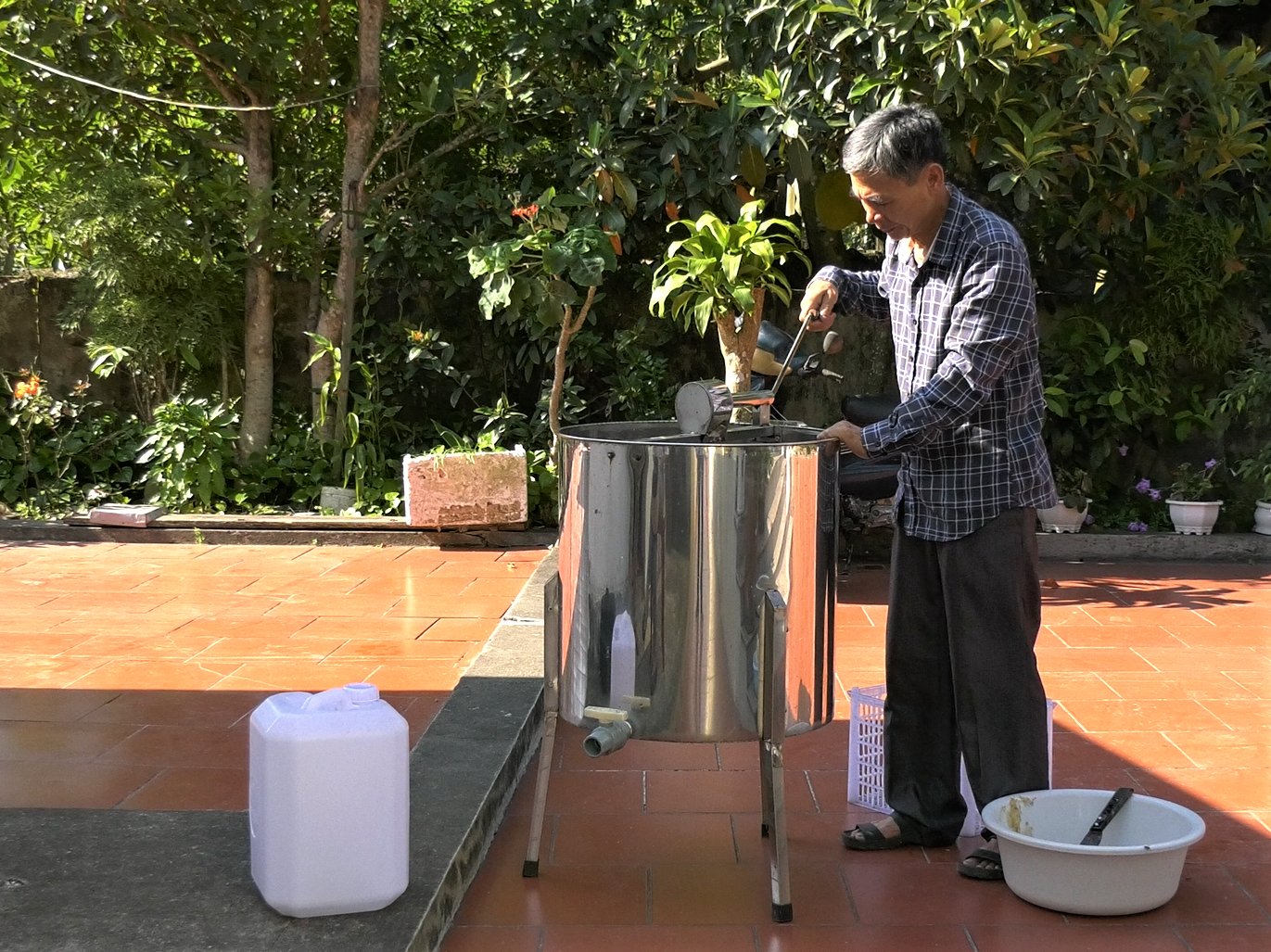
With a modern machinery system, honey will be pressed and dewatered to ensure that the water content in honey is below 23%. Photo: Dinh Muoi.
Compared to other semi-naturally farmed honey products, honey raised from mangroves always ensures that there is no pesticide residue in the bee's food source. The content of minerals is higher, so honey is better quality and more nutritious. Due to such outstanding properties, the honey product of Tung Hang Cooperative is considered a speciality of the coastal mangroves.
In the coming time, specialized units of the agricultural sector and local authorities will continue to provide technical advice, select good varieties, at the same time, support propaganda, trade promotion, and promotion of mangrove honey products to the market.
“I have known and loved honey bees since 1987 when I was doing military service in Tien Yen district, Quang Ninh province. Every weekend, I follow the unit's staff into the forest to catch honey bees to raise. After demobilization, because the locality has no forests and mountains, beekeeping is very difficult to develop. Later, when the locality had mangroves, I started to raise bees for honey. Starting a business with only 2 bee colonies, so far my family is raising 200 colonies, supplying about 2,000 litres of honey to the market, with a revenue of VND 500 million/year", Mr Bui Thanh Tung shared.
Translated by Hoang Duy

(VAN) Several scientists and farmers are experimenting with soil treatment in some key durian-growing regions such as Cai Lay (Tien Giang), Dak Song, Gia Nghia, and Dak R’lap (Dak Nong).
/2025/05/25/4127-3-073637_820.jpg)
(VAN) Thanks to the promotion from an FAO-implemented project, vegetable production in greenhouses in Moc Chau has seen strong development, from 1.5 hectares in 2021 to nearly 50 hectares in 2024.

(VAN) FAO has recently supported USD 140,000 to implement the project 'Risk mitigation human-animal interface risks through disease control initiatives in pig farming.'

(VAN) The People's Committee of Tra Vinh province has approved an adjustment to the investment policy for the Green Hydrogen Plant project, increasing its area to approximately 52.76 hectares.
![Reducing emissions from rice fields: [2] Farmers’ commitment to the soil](https://t.ex-cdn.com/nongnghiepmoitruong.vn/608w/files/news/2025/05/05/dsc08881jpg-nongnghiep-140632.jpg)
(VAN) Clean rice cultivation model in Thuong Tan commune, Bac Tan Uyen district, is assisting local residents in achieving sustainable agriculture by substantially reducing costs, increasing productivity, and protecting the environment.

(VAN) At the conference to disseminate Resolution No. 68, AgriS introduced its digital agricultural ecosystem and reaffirmed its commitment to accompanying the Government in promoting private sector development and sustainable agriculture.

(VAN) 'Blue Ocean - Blue Foods' initiative is designed to restore marine ecosystems and establish sustainable livelihoods for local communities by cultivating a minimum of 1,000 hectares of cottonii seaweed in the first three years.